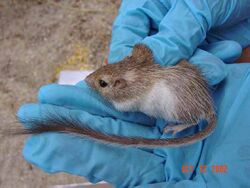Biology:Spiny pocket mouse
| Spiny pocket mouse | |
|---|---|

| |
| Scientific classification | |
| Domain: | Eukaryota |
| Kingdom: | Animalia |
| Phylum: | Chordata |
| Class: | Mammalia |
| Order: | Rodentia |
| Family: | Heteromyidae |
| Genus: | Chaetodipus |
| Species: | C. spinatus
|
| Binomial name | |
| Chaetodipus spinatus (Merriam, 1889)
| |
The spiny pocket mouse (Chaetodipus spinatus) is a species of rodent in the family Heteromyidae and order Rodentia. It is found in Baja California in Mexico and in Arizona, California and Nevada.[1]
Description
The spiny pocket mouse has long hairs and spines on its back that are flexible. These spines differentiates C. spinatus from pocket mice in other genera.[2] Their ears are small and round. They have long tails that are 126% of the length of their head and body. Their coat colors vary among islands but are generally brown on the tops of their bodies and tan on their sides. A spiny pocket mouse weighs about 13–18 g (0.46–0.63 oz). Their body length ranges from 164 to 225 mm (6.5 to 8.9 in).[3]
Distribution and habitat
Spiny pocket mice are found in Southern Nevada, and in the islands of the Gulf of California at elevations up to 900 m (3,000 ft). They also range from southeast California to the south by the cape of Baja California Peninsula (Mexico) where they are native. Because of its wide range in distribution and its absence in agricultural areas, the spiny pocket mouse population has little concern of extinction.[1]
Diet
This mouse's diet varies according to the habitat it lives in. Their diet probably consists of seeds and green vegetation at times of rainfall. Since water is a rarity in its habitat, it is likely that it mainly derives its water from food.[1]
Ecology
The spiny pocket mouse is nocturnal. This characteristic allows the spiny pocket mouse to live in rough, rocky desert landscapes by taking refuge during the hot days.[1] They sleep, breed and keep their young in burrows.[according to whom?] Their main predator are feral cats.[1]
References
- ↑ 1.0 1.1 1.2 1.3 1.4 1.5 Linzey, A. V.; Timm, R.; Álvarez-Castañeda, S. T.; Castro-Arellano, I.; Lacher, T. (2008). "Chaetodipus spinatus". IUCN Red List of Threatened Species 2008. https://www.iucnredlist.org/details/4338/0. Retrieved 27 March 2009.
- ↑ Merriam, C.H. (1889). "North American pocket mice". North American Fauna. Smithsonian Institution. http://eol.org/data_objects/6624619. Original publication; doi:10.3996/nafa.1.0001
- ↑ Lackey, James Alden (6 November 1991). "Chaetodipus spinatus". Mammalian Species. The American Society of Mammalogists. http://www.science.smith.edu/departments/Biology/VHAYSSEN/msi/pdf/i0076-3519-385-01-0001.pdf.
Further reading
- Anderson, R. P.; Weksler, M.; Rogers, D. S. (2006). "Phylogenetic analyses of spiny pocket mice (Heteromyidae: Heteromyinae) based on allozymic and morphological data". Journal of Mammalogy 87 (6): 1218–1233. doi:10.1644/06-MAMM-A-096R1.1.
- Patton, J. L. (2005). "Heteromyidae". in Wilson, D. E.; Reeder, D. M.. Mammal Species of the World (3rd ed.). Baltimore, MD: Johns Hopkins University Press. pp. 844–858.
Wikidata ☰ Q308751 entry
 |


